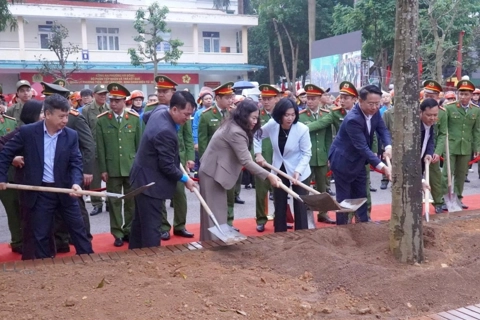Social Affairs
Foreign education investors keep big interest in Vietnam
Sep 08, 2019 / 08:01 AM
Rising demand and better income have greatly made Vietnam`s education center of attention for the past years.
The Vietnamese education market has been seeing an increasing interest from international investors, given by the rising local demands and income as well as the government’s incentive policies on luring investments in the sector.
According to Nguyen Lan Phuong, partner at Baker McKenzie Vietnam, the country’s educational market is very promising and active. Vietnam’s commitments made to World Trade Organization in the educational sector, together with the domestic education-related laws and decrees, such as Decree No.86/2018/ND-CP on foreign co-operation and investment in education, have laid a foundation to bring in foreign investors.
Vietnam’s educational sector has become even more of an attraction thanks to Decree 86, which came into force in August last year with an aim to increase the number of international schools being set up in Vietnam, Phuong said.
In addition, she said, with the 95-million people population and a young demographic profile, the appeal of the educational sector is a given.
Meanwhile, the rise in the number of public schools has not been in line with increase of population. Parents want to equip their children with more soft skills which are not offered in public schools. The private sector has stepped in to meet this demand.
Besides, experts attributed the rising trend of investors in the Vietnamese education to an increase of the middle-income class in Vietnam, which is expected to see an increase from 12 million people in 2014 to 33 million in 2020.
The average income per capita in Vietnam is expected to increase from US$1,400 in 2014 to US$3,400 over the next few years, while the family size is shrinking. Of course, the average per capita income is considerably higher in the major cities and exceeds US$5,000 in Hanoi and Ho Chi Minh City.
Besides, experts said that the Vietnamese economy is switching from primary labor-intensive manufacturing to more services. So the educational sector is front and center as the need to upgrade the capacity of the workforce becomes more urgent.
“We have observed a lot of interest from industry players and private equity funds with a focus on education. We have seen foreign financiers who want to invest in minority ownership first to test out the market, and we have also seen a number of players that have made substantial investment in education institutions,” Phuong said.
Rising trend
Reports from the Ministry of Planning and Investment’s Foreign Investment Agency showed that accumulative investment projects in the education sector have increased 16.3% since Decree 86 came into effect.
Merger and acquisition transactions have accounted for most of the foreign investment since the related regulations on such transactions in education were further clarified in Decree 86.
According to experts, the prospects for FDI attraction in the local education industry are positive in the coming years.
Benjamin Yap, Senior Partner at RHTLaw Taylor Wessing Vietnam, said that the prospects for Vietnam’s educational investment will increase with greater transparency created by the reformed regulations.
The Vietnamese government encourages both local and foreign investors to mobilize capital for the education sector, he said, adding that this is evident in the issuance of Resolution No. 35/NQ-CP dated June 4, 2019. The government aims to create more conditions which are favorable for investments. This will promote greater private investment in the region, of 16 to 40 percent (subject to the type of education institution) higher than public investment.
A survey conducted by Grant Thornton Vietnam Ltd this year also showed that 35.4 percent of respondents selected education as the second-most attractive sector over the next 12 months in Vietnam.

An increase of the middle-income class makes Vietnam’s education more attractive.
|
According to Nguyen Lan Phuong, partner at Baker McKenzie Vietnam, the country’s educational market is very promising and active. Vietnam’s commitments made to World Trade Organization in the educational sector, together with the domestic education-related laws and decrees, such as Decree No.86/2018/ND-CP on foreign co-operation and investment in education, have laid a foundation to bring in foreign investors.
Vietnam’s educational sector has become even more of an attraction thanks to Decree 86, which came into force in August last year with an aim to increase the number of international schools being set up in Vietnam, Phuong said.
In addition, she said, with the 95-million people population and a young demographic profile, the appeal of the educational sector is a given.
Meanwhile, the rise in the number of public schools has not been in line with increase of population. Parents want to equip their children with more soft skills which are not offered in public schools. The private sector has stepped in to meet this demand.
Besides, experts attributed the rising trend of investors in the Vietnamese education to an increase of the middle-income class in Vietnam, which is expected to see an increase from 12 million people in 2014 to 33 million in 2020.
The average income per capita in Vietnam is expected to increase from US$1,400 in 2014 to US$3,400 over the next few years, while the family size is shrinking. Of course, the average per capita income is considerably higher in the major cities and exceeds US$5,000 in Hanoi and Ho Chi Minh City.
Besides, experts said that the Vietnamese economy is switching from primary labor-intensive manufacturing to more services. So the educational sector is front and center as the need to upgrade the capacity of the workforce becomes more urgent.
“We have observed a lot of interest from industry players and private equity funds with a focus on education. We have seen foreign financiers who want to invest in minority ownership first to test out the market, and we have also seen a number of players that have made substantial investment in education institutions,” Phuong said.
Rising trend
Reports from the Ministry of Planning and Investment’s Foreign Investment Agency showed that accumulative investment projects in the education sector have increased 16.3% since Decree 86 came into effect.
Merger and acquisition transactions have accounted for most of the foreign investment since the related regulations on such transactions in education were further clarified in Decree 86.
According to experts, the prospects for FDI attraction in the local education industry are positive in the coming years.
Benjamin Yap, Senior Partner at RHTLaw Taylor Wessing Vietnam, said that the prospects for Vietnam’s educational investment will increase with greater transparency created by the reformed regulations.
The Vietnamese government encourages both local and foreign investors to mobilize capital for the education sector, he said, adding that this is evident in the issuance of Resolution No. 35/NQ-CP dated June 4, 2019. The government aims to create more conditions which are favorable for investments. This will promote greater private investment in the region, of 16 to 40 percent (subject to the type of education institution) higher than public investment.
A survey conducted by Grant Thornton Vietnam Ltd this year also showed that 35.4 percent of respondents selected education as the second-most attractive sector over the next 12 months in Vietnam.









